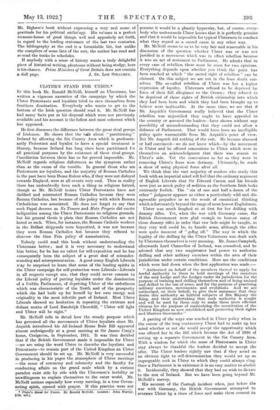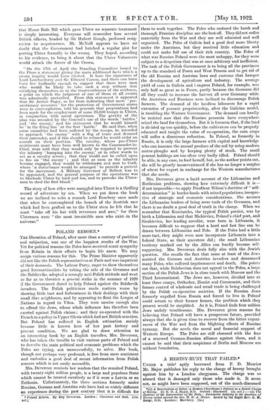ULSTER'S STAND FOR UNION.*
In this book Mr. Ronald McNeill, himself an Ulsterman, has written a vigorous narrative of the campaign by which the Ulster PrOtestants and loyalists tried to save themselves from Southern domination. Everybody who wants to get to the bottom of the Irish question should read it. Mr. McNeill has had many facts put at his disposal which were not previously available and his account is the fullest and most coherent which has appeared.
He first discusses the difference between the great rival groups of Irishmen. He shows that the talk about " partitioning " Ireland by allowing the Six County Area which is predomin- antly Protestant and loyalist to have a special treatment is illusory, because Ireland has long since been partitioned for all practical purposes by the existence of these rival groups. Conciliation between them has so far proved impossible. Mr. McNeill regards religious differences as the symptom rather than as the cause of the trouble. In general those who are Protestants are loyalists, and the majority of Roman Catholics in the past have been Home Rulers who, if they were not disloyal towards England, were at all events very cool. Thus in reality there has undoubtedly been such a thing as religious hatred, though as Mr. McNeill insists Ulster Protestants have not disliked and mistrusted Roman Catholics because they were Roman Catholics, but because of the policy with which Roman Catholicism was associated. He does not forget to say that such Papal decrees as Ne Temere and Motu Proprio did excite indignation among the Ulster Protestants on religious grounds, but his general thesis is plain that Roman Catholics are not hated as such. When, for instance, the Roman Catholic workers in the Belfast shipyards were boycotted, it was not because they were Roman Catholics but because they refused to disavow the Sinn Fein policy of assassination.
Nobody could read this book without understanding the Ulsterman better ; and it is very necessary to understand him better, for he has no talent for self-exposition and he has consequently been the subject of a great deal of misunder- standing and misrepresentation. A good many English Liberals tray be surprised to learn that some of the leading spirits in the Ulster campaign for self-protection were Liberals—Liberals in all respects except one, that they could never consent to the Liberal policy of putting loyalists under the domination of a Dublin Parliament, of depriving Ulster of the orderliness which was characteristic of the North and of the prosperity which she had built up for herself by her own energy and originality in the most infertile part of Ireland. Most Ulster Liberals showed no hesitation in repeating the extreme and defiant motto of Lord Randolph Churchill, " Ulster will fight and Ulster will be right."
Mr. McNeill tells in detail how the steady purpose which has governed all the movements of Ulster loyalists since Mr. Asquith introduced his All-Ireland Home Rule Bill appeared almost undesignedly at a great meeting at Sir James Craig's home, Craigavon, in September, 1911. It was then decided that if the British Government made it impossible for Ulster —we aro using the word Ulster to describe the loyalists and Protestants—to remain part of the United Kingdom an Ulster Government should be set up. Mr. McNeill is very successful in producing in his pages the atmosphere of Ulster meetings —the sense of ceremony and solemnity and the faculty for conducting affairs on the grand scale which by a curious paradox exist side by side with the Ulstermen's inability or unwillingness to explain themselves to the outer world. Mr. McNeill notices especially how every meeting, in a true Coven- anting spirit, opened with prayer. If this practice were not
• Ulster's Stand for Union. By Ronald McNeill. London: Sohn Murray. Me. net.]
genuine it would be a ghastly hypocrisy, but, of course, every- body who understands Ulster knows that it is perfectly genuine and that it would be impossible for typical Ulstermen to conduct what they regard as a sacred cause in any other way.
Mr. McNeill seems to us to be very fair and reasonable in his discussion of the question whether Ulster was or was not justified in a movement which was in effect rebellion because it was an act of resistance to Parliament. He admits that in every case of rebellion there must be room for two opinions. Everything depends upon whether you think the point has been reached at which " the sacred right of rebellion " can be claimed. On this subject we are not in the least doubt our- selves. The so-called rebellion of Ulster was but a higher expression of loyalty. Ulstermen refused to be deprived by force of their full allegiance to the Crown ; they refused to be deprived of those rights of British citizenship into which they had been born and which they had been brought up to believe were inalienable. At the same time, we see that if Mr. Asquith's Government really believed that the Ulster rebellion was unjustified they ought to have appealed to the country or arrested the leaders—have shown without any possibility of misunderstanding that they could not allow a defiance of Parliament. That would have been an intelligible policy quite warrantable from Mr. Asquith's point of view.
But Mr. Asquith did nothing of the sort. He became alarmed or half convinced—we do not know which—by the movement in Ulster and he offered concessions to Ulster which were in themselves an acknowledgment that there was reason on Ulster's side. Yet the concessions so far as they went in removing Ulster's fears were derisory. Ultimately, he made a show of using physical force after all.
We think that the vast majority of readers who study this book with an impartial mind will feel that the ordinary argument of English Liberals that Sir Edward Carson and his friends were just as much guilty of sedition as the Southern Irish looks extremely foolish. The " six of one and half a dozen of the other" judgment appears as either a particularly wild and dis- agreeable prejudice or as the result of casuistical thinking which is fortunately beyond the range of most honest Englishmen.
Ulster was much laughed at at first for her drilling with dummy rifles. Yet, when the war with Germany came, tho British Government were glad enough to borrow many of those dummy rifles in order that raw lads might be taught, as they very well could be, to handle arms, although the rifles were quite innocent of " going off." The way in which the legality of the drilling by the Ulster Volunteers was dealt with by Ulstermen themselves is very amusing. Mr. James Campbell, afterwards Lord Chancellor of Ireland, was consulted, and he advised that any two magistrates had power to authorize drilling and other military exercises within the area of their
jurisdiction under certain conditions. Here are the conditions which were laid down when the first application was made:— "Authorized on behalf of the members thereof to apply for lawful authority to them to hold meetings of the members of the said Lodge and the Lodges under its jurisdiction for the purpose of training and drilling themselves and of being trained and drilled to the use of arms, and for the purpose of practising military exercises, movements, and evolutions. And we are authorized, on their behalf, to give their assurance that they desire this authority as faithful subjects of His Majesty the King, and their undertaking that such authority is sought and will be used by them only to make them more efficient citizens for the purpose of maintaining the constitution of the United Kingdom as now established and protecting their rights and liberties thereunder."
A parting of the ways was reached in Ulster policy when in the course of the long controversy Ulster had to make up her
mind whether or not she would accept the opportunity which was offered her in the Bill which became the Act of 1920 of setting up a separate Government in the Six County Area. With a wisdom for which the mass of Protestants in Ulster may always be thankful the leaders decided to accept the offer. The Ulster leaders rightly saw that if they acted on an obvious right to self-determination they would set up an impregnable rock in Ulster to which they could always cling. Once a Parliament is in existence it is no easy matter to abolish it. Incidentally, they showed that they had no wish to dictate to the rest of Ireland. But we have been going beyond Mr.
McNeill's survey.
His account of the Curragh incident when, just before the war with Germany, the British Government attempted to overawe Ulster by a show of force and make them consent to that Home Rule Bill which gave Ulster no separate treatment is deeply interesting. Everyone will remember how several British officers, headed by Sir Hubert Gough, preferred resig- nation to acquiescence. Mr. McNeill appears to have no doubt that the Government had hatched a regular plot for putting Ulster formally in the wrong. They hoped, according to his evidence, to bring it about that the Ulster Volunteers would attack the forces of the Crown.
" On the 17th of April the Standing Committee issued to the Press a statement giving the main additional facts which a sworn inquiry would have elicited. It bore the signatures of Lord Londonderry and Sir Edward Carson, and there can have boon few foolhardy enough to suggest that these were men who would be likely to take such a step without first satisfying themselves as to the trustworthiness of the evidence, a point on which the judgment of one of them at all events was admittedly unrivalled. From this statement it appeared that Sir Arthur Paget, so far from indicating that more pre- cautionary measures ' for the protection of Government stores were in contemplation, told his generals that preparations had been made for the employment of some 25,000 troops in Ulster, in conjunction with naval operations. The gravity of the plan was revealed by the General's use of the words ' battles ' and the enemy,' and his statement that he would himself be in the firing line ' at the first battle.' He said that, when some casualties had been suffered by the troops, he intended to approach ' the enemy ' with a flag of truce and demand their surrender, and if this should be refused he would order an assault on their position. The cavalry, whose pro-Ulster sentiments must have been well known to the Commander-in- Chief, were told that they would only be required to prevent the infantry bumping into the enemy,' or in other words to act as a cavalry screen ; that they would not be called upon to fire on ' the enemy ' ; and that as soon as the infantry became engaged, they would be withdrawn and sent to Cork, where ' a disturbance would be arranged ' to provide a pretext for the movement. A Military Governor of Belfast was to be appointed, and the general purpose of the operations was to blockade Ulster by land and sea, and to provoke the Ulster- men to shed the first blood."
The story of how rifles were smuggled into Ulster is a thrilling record of adventure by sea. When we put down the book we arc inclined to echo a remark Lord Rosebery once made that when he contemplated the branch of the Scottish race which had been grafted on to the Ulster stem he felt that he must " take off his hat with reverence and awe," for these Ulstermen were " the most irresistible men who exist -in the universe."



































 Previous page
Previous page